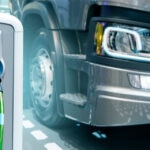"Electric and biogas buses and trucks to decarbonize road transport"
Amaya López-Durán Viani, head of the industrial sector observatory at BBVA's Sustainability area, analyzes in this article originally published in Cinco Días, the decarbonization of the heavy road transport sector.

New clean technologies (CleanTech) have also made their way to the heavy road transport sector. Although it may be hard to believe, this industry is actually moving rapidly towards decarbonization, with the number of zero-emission models growing by more than 35 percent from 2021 to 2022. And aside from electrification, there are other alternatives to help lower the sector’s greenhouse gas emissions.
The easiest way —and by no means the least important— is to regularly fit the vehicle population with more efficient engines to lower fuel consumption and the emission of other pollutants. This is still the best solution for very heavy vehicles or those that have to travel long distances.
According to the International Energy Agency (IEA), 126,000 electric buses and trucks were sold globally in 2022, representing 4.5 percent and 1.2 percent of total global sales respectively.
Gas as a fuel emits less in the way of greenhouse gases (GHG) than liquid fossil fuel, and if the gas obtained from oil also happens to be replaced by biogas, we can achieve up to an 80 percent reduction in emissions. Biogas has the same chemical composition as natural gas but is obtained from organic waste, whether slurry from farms, urban waste, or crop or pruning waste, and can be injected directly into the existing natural gas network.
Yet the future lies in the complete electrification of the industry and here battery cleantech will play a key role. As battery technology improves, electrification will be able to progress until such time as the electric motor becomes the norm. Notably, in October 2023, vehicle manufacturer Toyota announced that it was close to commercialization of its solid-state batteries, in the hope of having them in series production in 2027 or 2028. According to the experts, these batteries will be a game-changer in the electric vehicle industry, allowing for ranges of up to 1,200 km. Solid-state batteries also happen to be smaller, lighter and safer than today’s batteries. Meanwhile, other manufacturers such as MAN and Scania are already putting the first long-range prototypes on the market.
And what about hydrogen (H2)? We believe that H2 will not be the ultimate solution for the road transport sector because of the problems associated with long-distance transport. There is currently no short-term solution to the costs involved in getting it to hydrogen-based power plants and in ensuring its stability.
In a nutshell, the key to the successful decarbonization of road transport until 2030 will be chiefly CleanTech relating to efficiency, biofuels and electrification. Notably, the IEA is confident that bus electrification will outpace electrification in the private vehicle sector. We will have to wait until 2050 for hydrogen to play a bigger role, especially in heavy goods transport.
This transformation will need to be accompanied by heavy investment in electric charging infrastructure.
While electric charging technology seems to be fairly well established for cars, new technologies are still being tested for heavy vehicles, such as roads capable of charging trucks while they are being driven, or using catenary-type chargers for trains. Efficient and effective truck charging will certainly be a focus of research and investment in the coming years.
Last but not least, the regulatory landscape will need to keep evolving to keep up with the sector and all the CleanTech that comes with it. The European regulation, known as Euro 7, which will be deployed in the European Union for heavy-duty transport in 2029, will entail some fairly drastic changes in terms of emissions of both greenhouse gases and particulate matter suspended in the air. These restrictions will require some big changes in truck technology in order to keep trucks on the road and will need to be accompanied by concerted efforts in research and investment.
The need to decarbonize the sector together with the conclusions reached at the last COP 28, recognizing that greenhouse gases are the cause of global warming, will surely accelerate the transition to a more sustainable future.